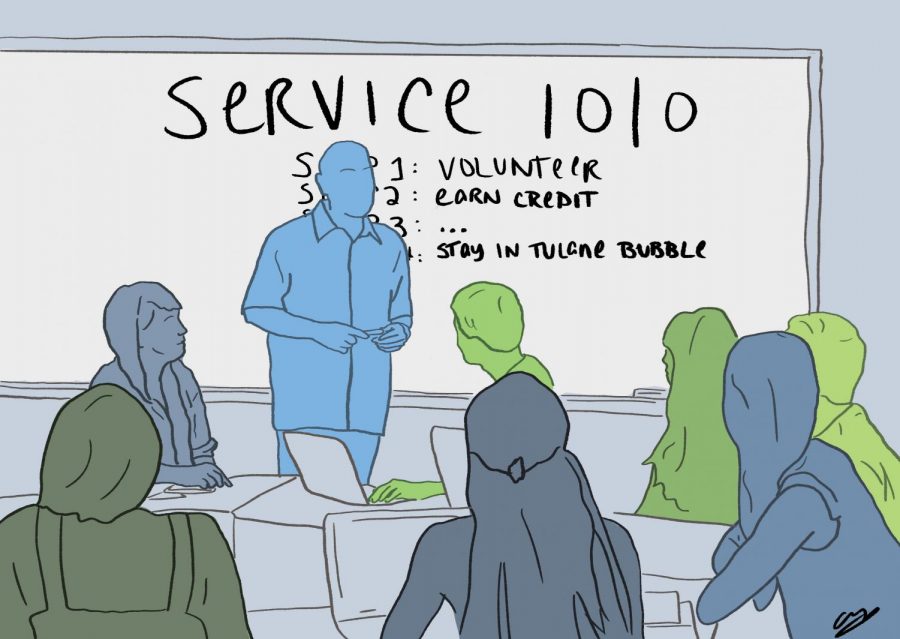Tulane needs to change values behind service learning
In high school, I was required to do 80 service hours for graduation and 100 service hours for National Honor Society. A lot of people get their service hours from helping food banks, volunteering at the animal shelters, community building at churches or high school/playground sports teams, or around the school.
The value behind the service lay in building the community. I never felt an unequal power dynamic or like an outsider when volunteering at second harvest food bank or building a garden at a nearby church or working concessions at a soccer game. Not only was I was part of the community, but I was also strengthening my community.
Service Learning at Tulane has significantly different guiding principles. The values behind Service Learning are, quite literally, to educate the student.
One of the most frequent learning outcomes of Service Learning is the embedded value of “border-crossing”. Students are expected to “enter communities” and give their time and attention to the community with which they are partnering. This is the fundamental difference between community service and Service Learning.
ICYMI: @usnews ranks Tulane 40th among the country’s top national universities and third in the nation in Service Learning.
https://t.co/R2gIWOzok6
— Tulane University (@Tulane) September 14, 2019
The perspective of a student in the Service Learning system is that of an outsider, particularly one with self-centered interests. As a member of a community, you are not completing service to learn something for yourself. Being a part of that community already makes you a kind of expert because it is your lived experience.
This is how I felt doing service hours in high school. If I am coming in to learn from the community, then my perspective is that of an outsider and my purpose is individual gain. I had nothing to learn from selling concessions at soccer games, but I did gain stronger community ties with other students.
The idea of service learning perpetuates the power dynamic that exists between Tulane as an elite higher-education institution and the New Orleans community. I had the pleasure of meeting former Mayor Mitch Landrieu this past weekend along with two other students from Tulane. After the other two students had introduced themselves as from Texas and New York, I introduced myself with my name and pronouns.
“And where are you from?” Landrieu asked.
“I’m from Metairie,” I said.
“Oh I didn’t know people from New Orleans went [to Tulane],” he joked.
Awkwardly and with hesitance, I responded, “Very few,”
The other people from the New Orleans area and I are hyper-aware of how much Tulane is not a part of the New Orleans Community. Tulane students by-and-large don’t come from New Orleans, so it seems impossible for Tulane students to have the same interactions in service as I did in high school. It is not that Tulane shouldn’t promote service in the New Orleans community, but the way we’re doing it now is wrong.
The professor for my current service learning class says her community partners initially denied her request to work with them. She had to prove herself as trustworthy to her community partners because of the inefficient and harmful ways Tulane’s service learning has interacted with the New Orleans community in the past. Coming at service learning with the intent to learn and benefit ourselves re-enforces our separation from the New Orleans community.
I would like to see a perspective shift in Tulane’s approach to service. Students new to New Orleans should not be doing service to learn, but rather to support, honor and express solidarity with the city in which they are living.
Tulane bitches be worried abt their favorite brunch places withstanding the storm but will never show any concern for the most vulnerable populations in New Orleans outside of getting their tier 2 service learning credit
— miller lowlife (@democracygurl) July 11, 2019
If our perspective is that we have something to learn from them, our community partners, then we are excluding ourselves from New Orleans’ greater community and network. Although we can’t change the student perspective as that of an outsider, we can approach our interaction with the New Orleans community in a less self-centered way.
I believe community-focused service would be a better requirement for students. A system where we advertise to the New Orleans community that we have students looking to help with their needs and projects, and they choose to contact us, instead of our system where teachers look for ways to create service opportunities aligned with their lesson plan in communities, and reach out to them for our self-serving interests.
Although, on the surface level, students may gain less from an academic standpoint, they would gain invaluable lessons and community resources. Coming to the community on its terms and joining it on equal ground is the most effective way to do community service.
Your donation will support the student journalists of Tulane University. Your contribution will allow us to purchase equipment and cover our annual website hosting costs.





